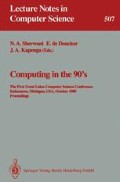Abstract
The incentive of the local task scheduling scheme developed here is to guarantee a maximum number of unpredictable critical tasks locally. In order to guarantee the execution of a critical task within a requested time frame, a Safety Time Factor (STF) is defined based on the estimated worst-computation time of the task and added to its execution time. A three-phase local task scheduling is designed to take advantage of accumulative safety times and provide alternatives for scheduling the critical tasks locally. At each phase a different class of critical tasks is scheduled. The performance of the model has been ested using the most recent task scheduling scheme as a baseline model.
Preview
Unable to display preview. Download preview PDF.
References
G.S. Alijani, "Object Mobility in Distributed Computing Systems", Ph.D. Thesis, Wayne State University, 1988.
S.R. Biyabani, J.A. Stankovic and Ramamritham, "The Integration of Deadline and Criticalness in Hard Real-Time Scheduling", Proc. Real-Time Sys. Sym., December 1988.
M.R. Garey and D.S. Johnson, "Two-Processor Scheduling with Start-Times and Deadlines", SIAM Journal, Comput., Vol. 6, No. 3, 1977.
R.L. Graham et al., "Optimization and Approximation in Deterministic Sequencing and Scheduling: A Survey", Ann. Discrete Math., Vol. 5, 1979.
J.W.S. Liy, K-J. Lin and S. Natarajan, "Scheduling Real-Time Periodic Jobs Using Imprecise Results", Proc. Real-Time Sys. Sym., December 1987.
J.A. Stankovic, K. Ramamrithm and S. Cheng, "Evaluation of Flexible Task Scheduling Algorithm for Distributed Hard Real-Time Systems", IEEE Trans. on Computers, Vol. c-34, No. 12, December 1985.
H.F. Wedde, G.S. Alijani and et al., "Operating Support for Adaptive Distributed Real-Time Systems in DRAGON SLAYER", ACM Operating Systems Review Vol. 23 No. 3, pp. 126–140, July 1989.
C.M. Woodside and D.W. Craig, "Local Non-Preemptive Scheduling Policies for Hard Real-Time Distributed Systems", Proc. Real-Time Sys. Sym., December 1987.
Author information
Authors and Affiliations
Editor information
Rights and permissions
Copyright information
© 1991 Springer-Verlag Berlin Heidelberg
About this paper
Cite this paper
Alijnai, G.S., Wedde, H.F. (1991). A three-phase task scheduling scheme in a hard real-time distributed environment. In: Sherwani, N.A., de Doncker, E., Kapenga, J.A. (eds) Computing in the 90's. Great Lakes CS 1989. Lecture Notes in Computer Science, vol 507. Springer, New York, NY. https://doi.org/10.1007/BFb0038512
Download citation
DOI: https://doi.org/10.1007/BFb0038512
Published:
Publisher Name: Springer, New York, NY
Print ISBN: 978-0-387-97628-0
Online ISBN: 978-0-387-34815-5
eBook Packages: Springer Book Archive

